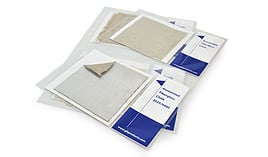Pharmaceutical production requires a wide range of infrastructure types to operate. The heating and cooling of materials through processes such as distillation and crystallization require a considerable amount of energy. Industrial insulation aids in minimizing the energy cost while also benefiting other parts of these facilities such as the mechanical piping system.
The piping plays a central role in the processes within the plant as it moves hot liquid, gasses, and other raw material through the production process. All of these systems need insulation because it helps to reduce heat loss while ensuring the temperature stability of the many processes.
Essential points to take into consideration when selecting insulation for indoor mechanical piping:
- Suitable for sanitary and wash down environments
- Mold and fungus resistant
- Non-Fibrous materials (no fine respirable particles)
- Non-Carcinogenic and no volatile organic compounds
- Non-Corrosive to all piping systems
- Meets or exceeds ASTM E84 smoke and flame rating (Class A)
- Superior thermal conductivity
The large facilities also have miles and miles of underground chilled-water distribution systems. Chilled-water is used for air-conditioning applications as well as process-cooling applications, which are vital to maintaining efficient and reliable production efforts.
The insulations generally used in chilled water temperature applications (33°F – 60°F) are:
- Cellular glass
- Elastomeric
- Glass fiber
- Mineral fiber
- Phenolic
- Polyolefin
- Polyisocyanurate
- Polyurethane
- Polystyrene
It is important to use the correct insulation material on chilled-water systems because water vapor will condense on the metal causing failure of the insulation system due to CUI (corrosion under insulation).
To learn more about insulation materials used for chilled-water systems within a pharmaceutical facility download our “Fabricated Pipe Insulation Guide” here.


